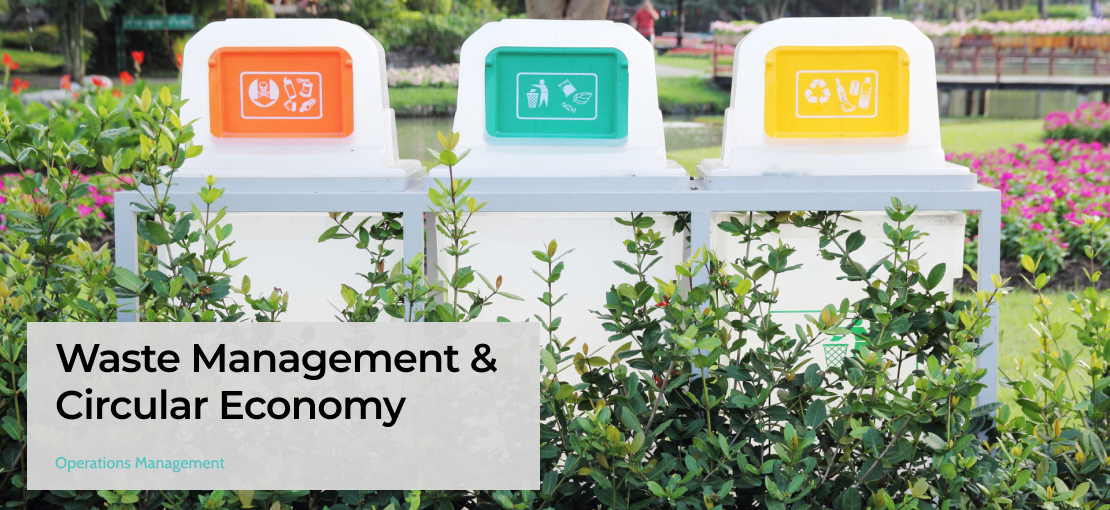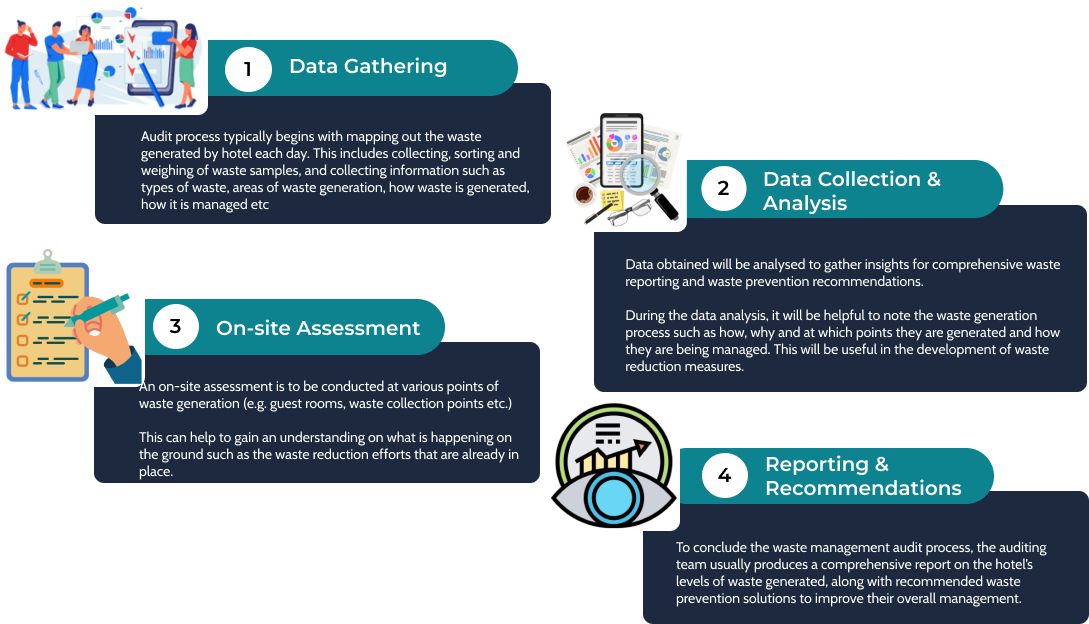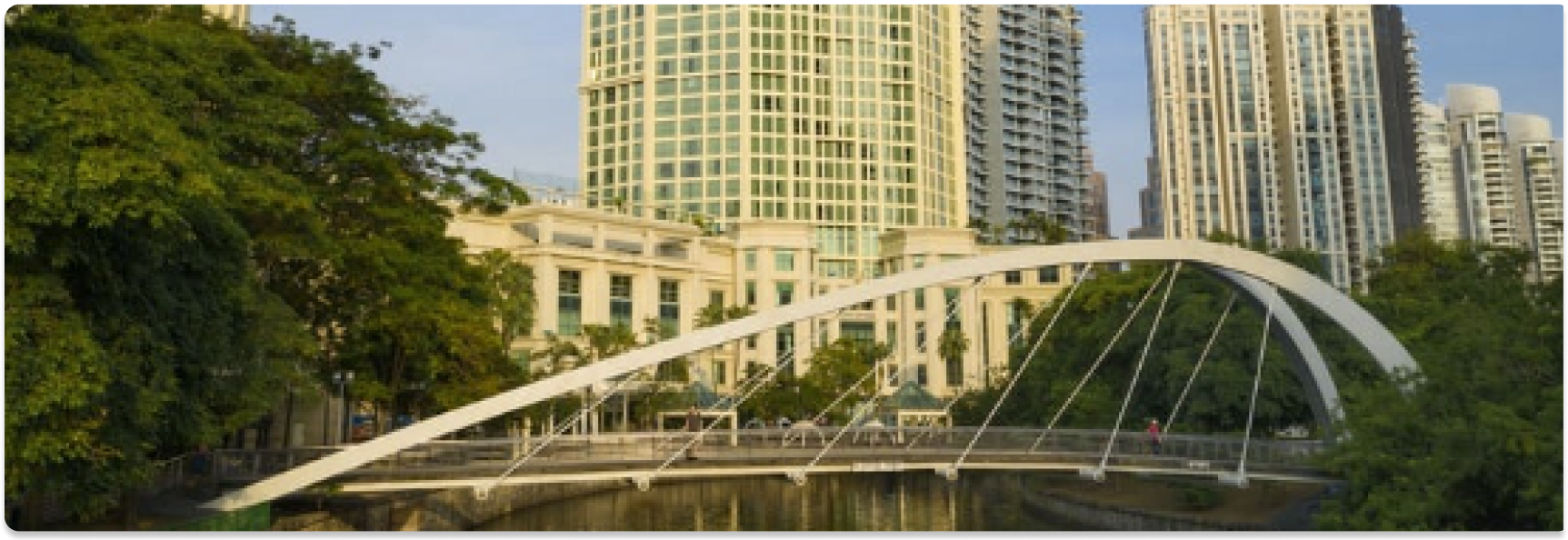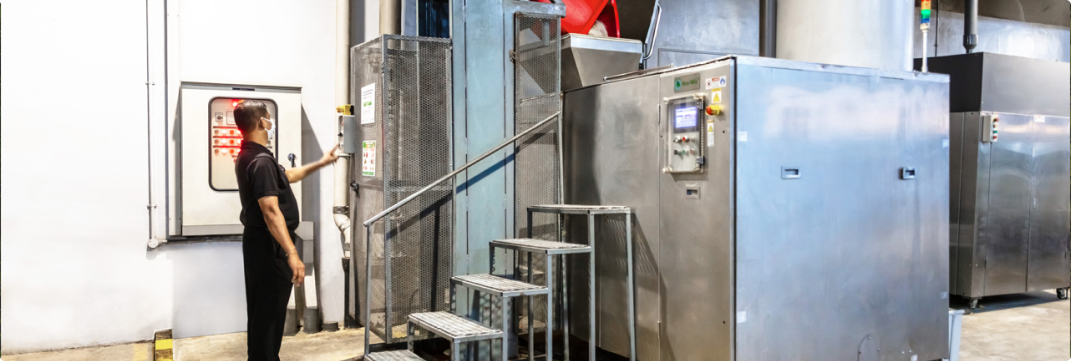
Despite having an efficient waste collection and disposal system in place, Singapore’s only landfill, Semakau Landfill is expected to reach its full capacity by 2035 if the waste generation rate remains unchanged. In response, Singapore has launched the Zero Waste Masterplan and set a new waste reduction target for Singapore – to reduce the waste sent to Semakau Landfill each day by 30% by 2030 – which will help to extend Semakau Landfill’s lifespan beyond 2035.
The hospitality industry, including hotels, is one of the significant waste generators in Singapore. Hence, it is important for hotels to understand that adopting sustainable waste management practices and embrace circular economy principles can truly minimise hotel’s carbon footprint. Waste is typically treated and broken down through an incineration process, this means larger amount of waste would inevitably output higher levels of carbon emissions into the atmosphere, causing further degradation to our environment.
To tackle this problem, hotels need a robust strategy and management framework that aims to resolve excessive waste and adopt a circular economy model. This is highly essential and relevant for hotels to remain competitive especially when guests and investors are increasingly focused on sustainability.Additionally, it will enable hotels to increase their resilience against future climate-related risks.
Our recommended methodology usually begins with an audit process, which determines the current rate, volume and type of waste produced. This helps to accurately isolate areas with large amount of waste generated, before implementing effective solutions to reduce, recycle, reuse and eventually eliminate waste entirely from the operational pipeline.
Other key management methods for waste elimination include knowledge building on the importance of sustainability, redirecting of viable waste to agencies to reuse and/or repurpose, and lastly exploring of value-aligned partnerships with waste reduction programs.
Here is an overview of common solutions that may be adopted by hotels to tackle excessive waste produced and increase circularity in hotel’s business. This is a non-exhaustive list as methods can be tailored based on business priorities and their individual requirements:
|
| Solutions: Reduce, reuse and recycle |
| Educate:
Educational engagements with staff and guests on reducing waste generation and circular economy concepts as well as the importance of incorporating these practices within their business operations. | |
| Monitor and Review: Implementation of waste monitoring systems to effectively manage hotel’s waste and excessive consumption in a strategic and orderly manner |
Hotels must manage existing resources wisely to prevent unnecessary accumulation and production of waste in their operational pipeline. Having a good waste management system that adopts circular economy framework is both advantageous for the businesses and our environment.
To this end, hotels will also be setting global sustainable standards for industry peers to follow suit.
Reference: Introduction (towardszerowaste.gov.sg)
Global Best Practices
General Audit
A thorough audit session is essential to probe at the volumes of waste generated from hotels’ daily operations to better manage their resources. It clearly highlights areas with high volumes of waste generated, allowing timely intervention for hotels to work on their waste reduction and elimination effectively.
The audit process will provide valuable insights that raises the efficacy of waste reduction and management.
Auditing is one of the first analytical steps that can be taken by hotels to understand the performance of their current state. A well performed audit would really be effective in targeting areas of key concerns and facilitating their efforts in achieving the sustainable goals of hotels.
Typically, an audit process consists of a few main steps. Some of these steps may vary in different industries and sectors, however, the general flow remains the same.

Hotels can consider using Hotel Waste Measurement Methodology developed jointly WWF-US and Greenview to collect waste data, measure and report waste in hotels. The tool was developed to provide a consistent framework that the industry can use to track waste, fill in data gaps, and report annual progress against goals.
References: Hotel Waste Measurement Methodology – Sustainable Hospitality Alliance
Solutions
Based on the audit insights gathered, hotels can deploy a variety of solutions to achieve higher efficiency in their waste management efforts and to increase circularity within the business practices. Strategies can be used independently, or in smart combination to prevent the generation of unnecessary waste and increase efficacy of closed-loop approaches in managing waste from hotel operations. Reducing waste also facilitates the overall cost-saving in hotels, leading to higher business productivity and satisfaction.
Here are some of the common solutions that highlight the effectiveness of waste prevention. Do note that the list provided is non-exhaustive.

For more solutions on how hotels can reduce, reuse and recycle waste, hotels can refer to NEA’s 3R Guidebook for Hotels.
Reference : Hotel Waste Measurement Methodology – Sustainable Hospitality Alliance
Education
Case Studies
International
Banyan Tree Holdings Limited (Banyan Tree Group) - Plastic Reduction

Banyan Tree Group recognize that plastic production and consumption contribute to greenhouse gas emissions and pose a significant threat to the health and wellbeing of people and the planet. Since their pledge to reduce single-use plastic on Earth Day 2018, they carry out measurement and tracked 31 categories of plastic for reduction. Compared to a 2017 baseline, Banyan Tree Group has reduced single-use plastic by 32%, with almost 5 million less pieces of plastic used in 2022, totaling 26.1 million pieces of plastic prevented from going to landfill or the environment since 2017.
The efforts to reduce is not only to eliminate where suitable alternatives are to be found but also to replace with compostable or biodegradable alternatives. Of three prioritised items, 2.5 million straws (99.7% reduction), 1.8 million bottles (41.6%) and 1.7 million bags (53%) across the Group were reduced. Bintan added a water bottling plant in 2020, by eliminating over 400,000 plastic bottles annually. These reductions were achieved despite the inclusion of use by newly opened properties. Such data is only available through Banyan Tree Group’s effort in their measurement and monitoring processes.
The overall reduction trend in single-use plastic for the Group continues despite reduced operations, newly opened properties, and the increase in select items due to necessary health measures during the pandemic.
For more information, kindly refer to the Banyan Tree Group Sustainability Report.
Reference: https://www.banyantreegroup-annualreport.com/sustainability/plastic-reduction-and-elimination/
Local
Mandarin Oriental - Paperless

Mandarin Oriental Singapore has taken significant steps towards waste prevention through a series of thoughtful initiatives such as encouraging digitalisation to go paperless, reducing print volume, eliminating of single-use plastic as well as partnering with local NGOs, to redirect surplus amenities from hotel operations.
Going paperless and reducing print volume
Mandarin Oriental digitalized its administrative process, which is a key step in waste prevention. Some of these processes include the digitalisation of in-room guest directory and use of e-signature tools.
Elimination of single-use plastics
Plastic items in guestrooms have been replaced with sustainable alternatives like glass bottles, paper or bioplastic packaging for bathroom amenities, and multi-use dispensers for travel-sized products. In Food and Beverage Outlets, bamboo or wooden cutlery has replaced plastic, and paper bags are used for takeaways.
Surplus resources rediverted from waste stream
Through collaborations with local NGOs, surplus amenities and used soaps are collected and redistributed to beneficiaries in Singapore. This is an excellent initiative on resource diversion, extending the lifespan of products and increasing the circularity of products within the market.
Since the implementation of its various circularity initiatives, the hotel has successfully reduced its waste intensity by 35% and increased the diversion rate by 29%. These initiatives reflect Mandarin Oriental Singapore's dedication to sustainable practices and its role in reducing environmental impact.
Grand Copthorne Waterfront - Diverting Resources

For hotels, PET bottled water is one of the many single-use items that contributes a significant proportion of solid waste. PET is produced from non-renewable fossil fuels, directly causing environmental harm if it is discarded wastefully and incorrectly. Manual labour is also required to segregate the bottle for recycling during the housekeeping, creating workflow inefficiency on a daily basis.
To reduce the load of PET bottled water from guest rooms, Grand Copthorne Waterfront hotel has installed water filters that are directly connected to taps that supply drinking water to guest rooms. This effectively reduces the need to use PET bottled water, averting waste from one-time use products.
The hotel identified key locations of water filters and tap points to ensure functionality of water being transported to all guest rooms in the property. Apart from reducing waste produced, this initiative has improved the overall guest experience as drinking water is available anytime at guests’ demand, enhanced staff knowledge and reduced business cost. The elimination of PET bottled water also meant removing water bottle procurement and manual distribution into rooms, allowing the cost saved to be channelled into other areas of hotel operations.
Additionally, this initiative has avoided more than 700,000 plastic bottles, equivalent to the reduction of more than 7100kg of plastic per year.
Resorts World at Sentosa - Waste Audit

As part of RWS Sustainability Masterplan 2030, RWS has actively taken steps in working towards their goal of 50% reduction of waste-to-landfill intensity. This is in alignment with the national Zero Water Masterplan.
RWS has established key processes in waste management. First, it is the development of waste management hierarchy to guide investment of resources in waste reduction. This approach focuses on responsible procurement, production and consumption to prevent waste, followed by methods to redirect waste – reuse, recycle and recovery. With this waste hierarchy integrated into their operations, decision-making is guided by this framework.
RWS also encourages guest participation in waste management. There are solar-powered Smart Bins and Reverse Vending Machine publicly available for guests to support RWS' waste management process. Recycling bins are made available for guests in all hotel rooms. Hotels operated by RWS also provide guests water carafes instead of PET bottled water. RWS has also started on segregating food waste, ahead of regulatory requirements to commence in 2024.
Second, to deepen its understanding of the waste generated, RWS has engaged a third-party partner to conduct a comprehensive waste profiling exercise to identify the composition of their general waste output. This provides valuable insights in developing targeted strategies for waste management and reduction.
Finally, RWS continues to explore circular economy innovations to reduce their waste-to-landfill intensity, such as conversion of food waste to fish feed. With these strategies, RWS has achieved a 49.3% reduction in operational waste-to-landfill in comparison to the 2015 baseline year. In recognition of RWS’ efforts in the reduction of their packaging waste, RWS has been awarded the Top Achievement Award under the Singapore Packaging Agreement (SPA) Awards for 3 consecutive years.
Monitor & Review
Waste monitoring is vital for hotels in advancing hotel’s waste management process. These monitoring systems are to facilitate the reduction of overall waste produced in hotels. Essential data captured for insight analysis will help to craft better solutions on waste management, leading to higher brand credibility and trust from guests.
Several other advantages include:
